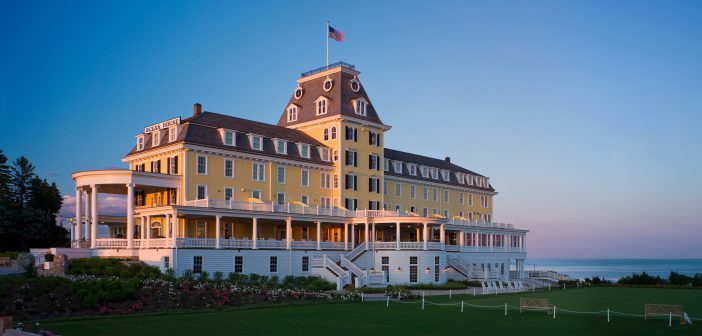
Daniel Hostettler
Get inspiration from Daniel Hostettler, Ocean House/OHM president and incoming Relais & Chateaux North America president, who shares his secrets for unsurpassed customer service.
by MICAH SOLOMON
Most of the time, Daniel Hostettler manages to look and sound the part of a cultured, Swiss-educated hospitality professional. (Picture John Le Carré’s elegant and impeccable Night Manager without, to my knowledge, the international arms intrigue.) But he transforms into something alarmingly like a macho armed forces recruiter, reverse psychology and all, when he speaks to applicants who are considering a position at Ocean House, the triple-five star resort he helms, a yellow-clad Victorian wooden pleasure structure that rises high above a pristine strip of southern Rhode Island seashore. (A quick primer on those stars: that’s 15 stars, awarded by Forbes: five for food, five for lodging and five for the spa. There are only 11 properties in the world with 15 stars, and fewer than half that number are, like Ocean House, independently owned and operated.)
Overhearing Hostettler giving the talk to someone who wants to work here, you’ll hear him deliver a hefty dose of discouragement. To hear him tell it, working here is the toughest job in the industry. “If you just want to work pretty hard and do a pretty good job, you’re clearly qualified and there are literally a million other positions in the hospitality industry that would work out for you.” But that’s not the way things are done, he continues, here at Ocean House, or at its sister property, the outdoorsy Weekapaug Inn down the road, or at The Blantyre, a smaller five star property in the Berkshire mountains of Massachusetts that Hostettler and his OHM management team assume management of this winter. Working here requires an employee to never have an off day, at least not in a way that is discernible to guests. You have to bring your A-game every single day, Hostettler says, because the guests here are sophisticated, well-traveled and expecting perfection. And because maintaining a five-star rating requires a score in the 90s on a Forbes inspection that can come at absolutely any time. (All three OHM properties are also subject to stringent inspections as member properties of Relais & Chateaux, the iconic association of independent luxury inns and restaurants. Hostettler will be assuming the North American presidency of the Relais & Chateaux organization in 2018, taking the reins from storied restaurateur and innkeeper Patrick O’Connell of The Inn at Little Washington, who has headed the organization in North America for the last dozen years.)
Of course, if prospective employees fail to be deterred by Hostettler’s warning and do end up working here, they can pretty much write their own employment ticket afterward, once they have Ocean House or one of its sibling properties on their résumé.
Consider, for example, this telling detail of the Ocean House approach. Most luxury guests, here and elsewhere, are familiar with the single-serving Heinz condiment bottles of mayo, Dijon, and ketchup that have somehow become de rigueur in high-end room service presentations. The difference here is that, under Hostettler’s tutelage, the cellophane wrap on each individual bottle (which is nearly impossible for a guest to see, let alone unwrap with their bare hands) is preemptively removed by hotel staff to avoid frustrating a guest later on who is trying to enjoy their room service meal. The problem is that guests unconsciously are frustrated by this detail, and it detracts from their experience even if they don’t specifically register it as a problem.
Another Ocean House exclusive? At Ocean House, you’ll never stumble over a room service cart in the hallway, covered with sad reminders of someone’s (perhaps your) late night food choices that don’t look as good in the harsh light of morning. This is a pet peeve of Hostettler, and he’s devised his own technological solution to keep the corridors free of last night’s room service detritus. “I embedded microchips in the room service carts, and a chip reader in the door frames, so that when a guest pushes the cart into the hallway, it sends an alarm to the panels for the floor valets,” – not just a one-off alarm, by the way, but one that keeps ringing and blinking until the valet acknowledges the alarm and collects the cart. Hostettler says this is an example of one of his particular passions, “using technology behind the scenes that the guest never sees, to deliver a five-star customer experience.”

Ocean House Veranda
What exactly is a five-star customer experience? We should consider the defining standards of the people who determine its existence or its absence: Forbes, whose predecessor, the Mobil Travel Guide, invented the Five Star rating system in 1958 and who continue to enforce it via a very-tough 900-point inspection system. All of which is mysterious and proprietary, as it should be, so I will, with circumspection, stick to parts of the Forbes criteria that have been publicly revealed and acknowledged.
To wit:
Don’t say no to a guest without offering a couple of reasonable alternatives.
This is in essence a version of the well-known customer service maxim, “The answer is yes – now what is the question?” but applied to real-life service situations where sometimes you can’t deliver the yes that a guest was hoping for, such as, “Yes, we’re open for breakfast,” even when it’s well past noon. According to this Forbes standard, saying no to seating guests for breakfast is acceptable only if you offer a couple of reasonable alternatives. In the case of Ocean House, I expect that the alternatives include, “We have 24-hour room service; I can take your order from you right here, if you like, and serve you either in your room or in our lovely seaside verandah area.”
I ask Hostettler for a second alternative that Ocean House might propose in this scenario. “First off, we wouldn’t tell them the dining area is closed unless absolutely necessary. And if that is necessary, we would offer to serve them by the fireplace in the living room area that’s just beyond the restaurant, or, as you suggest, on the outdoor verandah, if the weather is suitable.”
Although the Forbes Five Star ratings system gives more weight to service than setting – 70/30, in fact, in favor of service vs. facility – allow me to set the scene at this point. Ocean House towers spectacularly over what truly must be the most perfect Atlantic seaside location in America, high above a beach that was named by the New York Times as one of the 10 best swimming spots in the world. It’s one of only a handful of oceanfront hotels still operating in and continuing to define the landscape of coastal New England. Even though its location and landmark appearance date back 150 years (to just after the Civil War), the structure was re-created, beam by beam, stone by stone, by a dedicated property owner, Charles Royce, in collaboration with the local historical authorities, an approach that improved its flood-worthiness and allowed technological, soundproofing, and systems improvements and innovations rarely found in other historic properties.
How does Hostettler himself define five-star customer service? “Central to my definition is a different experience for every guest.” Not long ago, an incoming couple, who had intended to honeymoon in the Caribbean, learned that their intended hotel there had been destroyed in recent hurricanes, so they headed to Rhode Island for a non-tropical, but just as beachy, consolation trip. In anticipation of their arrival, the Ocean House staff gathered sand and seashells from their own (chilly) beach, dug two margaritas into the sand, and placed the resulting plated tableau on the nightstand with a note that read, “We’re bringing the Caribbean to you,” further setting the scene with calypso music on the guestroom sound system.
How does such a creative, personalized experience get developed and delivered? Hostettler credits it back to the kind of people he has working here, and the ethos they share as a team. “This is the kind of effort that the people we have working here take pride in, starting with the reservationist who took it on herself to note the detail [of the cancelled Caribbean trip]and bring it to the team’s attention so we could act on it. There’s no way to make someone take that extra effort. This goes back to good hiring, and the environment, or culture, that develops when you have so many committed people working together and feeding off each other’s energy.”
A big part of what keeps such efforts flowing is the fact that Hostettler works, elbow to elbow, along with his team. Although quick to praise his mentors, such as Ali Kasikci at The Peninsula (one of the best detail people in the business, Kasikci taught Hostettler much of his methodology, including how to productively deal with cellophane wrappers), Hostettler has also had would-be mentors he rebelled against, one in particular who told him that the way to deliver five-star service was to avoid being hands-on as a manager.
This fellow discouraged Hostettler when he saw him pouring coffee for a guest when Hostettler was just starting out as a manager. His dubious theory? A manager should never be seen pouring coffee at the table, because later, if a guest has a problem and demands to see a manager, they won’t respect him as much.
And I thought to myself, “That’s the dumbest thing I ever heard.” If I’m pouring coffee, first of all, the waiters will know that they’d better step up their game because their manager is running around pouring coffee in their sections, which means they’re probably falling behind. And second of all, to me [as a guest], there’s nothing less comfortable than sitting at the table with your wife, having a conversation, when someone you’ve never seen before walks up out of the blue and says, “Are you enjoying your meal?” It’s a total disconnect. But if I’m going through my dining room and pick up the bottle of wine on their table, or the coffee pot, and refresh their drinks, I can organically ask, “Are you enjoying everything?” and instantly read the table. If they say, “Yes, thank you,” I know they don’t want to have a conversation. If they start chatting with me, then I know that they’re in the mood for interaction, so that’s my opening foray into touching the table.
For Hostettler, this hands-on style of management is essential, and not just in the dining room. “There’s no way you’re going to achieve five-star service sitting back in your office,” Hostettler says. “In fact, if I were going to define leadership in one sentence, it’s this: ‘Leadership is managing from the front rather than the back.’” On the floor is where you see everything, about guests, about employees. Just as important, “I would never ask anyone to do anything that I wasn’t willing to roll up my sleeves and do right along with them. I believe one of the reasons our turnover is low and our staff works so hard is that they absolutely know that if they get slammed with a big group arrival, Alice [Brennan, VP of HR], Antonia [Korosec, General Manager], and I will be on the driveway parking cars with them side by side. You’ll even find me some Saturday nights, in the kitchen, in banqueting, when we have a wedding for 200 people, plating up the food with the kitchen staff. Because I enjoy it, and because sometimes I overhear the newest employees saying, as I’m leaving, “I cannot believe that the president of the company just plated up dinner with us.” ■
Micah Solomon is an author, consultant, keynote speaker and trainer focusing on customer service, the customer experience, consumer trends, hospitality and company culture. His latest book, The Heart of Hospitality: Great Hotel and Restaurant Leaders Share Their Secrets, brings together the customer service wisdom of the greatest hotel and restaurant leaders in the world. To learn more, visit www.micahsolomon.com.
Photos courtesy of Ocean House




